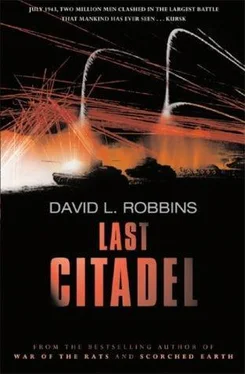Below, the earth slid by, the color of cobwebs and ghosts, soaked in the full moon. Plumes of dust rose from the vast grasslands, the thin stalks were smashed flat in straight lines, the unmistakable sign of tank columns. These are our tanks, she thought. Hundreds of them, on night maneuvers.
Katya put her hands and feet back on the controls. She shoved the stick hard to the left. Even laden with bombs, the plane snapped into a quick barrel roll. Blood rushed behind her eyes, bulging them, but she kept her stare on the dim horizon. When the world had twirled once, she returned the stick to center and leveled the U-2.
The voice of her navigator, Vera, seated in the cockpit behind her, nibbled in her headphones.
‘Saying hi to your papa?’
‘Just in case he’s looking.’
Katya scanned her dials and gauges. Air speed was sixty mph, at thirty-one hundred feet. The U-2 was made of plywood and fabric. A flight trainer before the war, it held no radio, almost no navigational equipment, no armor to protect a pilot and navigator who were without parachutes, and had a maximum speed of seventy-two miles per hour. But the bi-plane was steady in flight, easy to control, and capable of sustaining uncommon damage. It could be flown low and slow for accurate bombing runs and required very little room to land and take off. The U-2 was flown against the Germans, at night. It was piloted, navigated, armed, and maintained by squadrons of women.
‘How far?’ Katya asked.
She waited moments for Vera’s answer. The navigator had to compute direction and distance by landmarks and maps, also by a stopwatch. The plane’s compass would not work dependably in the skies over this region of the steppe because of the huge iron-ore deposits around Kursk. Katya marveled at the navigators’ abilities; it was these women’s job to get the bombers to the night’s target, then guide them home, steering their pilots on the darkest eves by stars and ticking seconds, in fog banks and clouds by instinct. Tonight the moon made Vera’s job easier while it made Katya’s harder. The pale light and clear air also provided a splendid backdrop behind their little plane for the Germans to spot them.
‘Hold at this speed and heading. Ten minutes, thirty seconds.’
About twelve miles, thought Katya. Good. If Papa and Valentin are below in that field, they might be able to see the explosions. The target tonight was an ammo dump.
Katya and Vera were the lead flight on this mission. The planes behind her would zero in on the fires they started. The entire regiment would be in the air, one plane every three minutes, all night long.
Katya took a gulp of the warm night air rushing past her open cockpit. The U-2 engine pop-pop-ed and spit burps of blue flame from the exhaust ports. She mimicked the noise, popping her lips, bored with the straight flying and exhilarated by the thrill and danger of the mission, all at once. She released the stick and pulled her boots up into the seat. Katerina Dimitriyevna Berkovna stood, bending her knees to miss the upper wing and fuel tank, and stretched her arms wide.
Vera, with a duplicate set of controls in the rear cockpit, made sure the U-2 stayed even, not because she was worried about her pilot falling out, Katya knew, but because to deviate would disturb her calculations. Katya was trained from birth to stay in any saddle, on any horse, even a flying one. Now she sat down, feeling Vera’s hands release the stick to her.
‘One day,’ Vera spoke into the intercom.
‘One day for everything,’ Katya answered. She reached one arm out of her cockpit and slapped the cloth fuselage to pretend she could make it go faster. In her earphones, Vera laughed.
The ground below did not alter its outward character – the earth rolled by in brackish swaths, villages clotted dark and abandoned -but the forces moving along it changed utterly. The Red Army’s tanks gave way to densely packed outposts pocked into the earth, with clusters of antitank weapons inside trenches and behind sandbagged revetments and dirt berms. The defense works were miles in depth and as wide as Katya could see in the moonlight, but in minutes even these floated behind her. Then she was over no-man’s-land, a three-mile-wide plain of minefields and barbed wire, tank obstacles and ditches. Below, ten thousand Soviet soldiers stared across a lethal grassland at their German counterparts. Katya felt herself flying into a chill, the way she always did entering the airspace above enemy territory. The plane bumped, as if the tension coursing back and forth beneath it created its own turbulence.
She put her hand hard on the stick and eased out the throttle. Vera said, ‘Climb,’ and Katya pulled back on the stick. This was to gain altitude over the approaching target, as well as get distance from the first small-arms fire from the ground, soldiers aiming up into the gloom hoping for a lucky shot, recognizing the sound of the approaching U-2s, the popping engines, the slow and low flight of the woman bomber pilots they’d come to call Night Witches.
Katya took the U-2 up to four thousand feet and leveled. She waited for Vera’s voice, they were over the German lines now. The engine thrummed and the slipstream whistled through the struts. Katya fixed on a star low on the horizon and flew straight to it. The star made her think about her Papa. Papa and her brother, jammed like kippers inside a tank. Slow, heavy, and ponderous creatures, the tanks. No wind in the face. She smiled; if anyone can make a tank gallop, it’s Papa. She sent Valentin letters about her flying; he answered about what life was like trapped inside a can with their father. Her whole family was at war. This was the first time they’d shared the same battlefield; her regiment had spent the winter in the Crimea, Papa and Valya were at Stalingrad. Now she flew at night over their heads. Cossack families always go to war together.
Vera intoned, ‘Steady’ the way she always did in the last approach to the target, her calculations almost complete, and Katya pulled her gaze from the star. She felt needles in her stomach; she’d learned over more than three hundred sorties to ignore them. Another minute of engine and wind whipped by. Inside her goggles, a bead of sweat itched beside her nose. Every new second flew alongside, silver and anxious.
Then Vera gave the order. ‘Cut engine.’
Katya shoved in the throttle, the engine coughed and died. The propeller blades slowed to a powerless windmill. Now the plane sailed only on its wings. In an instant the feel of the stick and rudders was different; without the propulsion of the motor Katya rode the night air, not demanding but asking for flight, tickling the air for what lift she could draw from it to keep her plane and her mission in the sky. The U-2 was much more alive in her hands; the night was full of invisible gifts and traps and Katya had to find them.
In the rear cockpit, Vera lit two parachute flares and cast them out. Katya banked left to watch the flares drift and lend their incandescence to the moon. The U-2 was down to thirty-five hundred feet now, low and mute enough for her to hear sirens blare below. She saw men run. Some dropped to their knees and fired, muzzles flashed on the ground, jittering under the swaying chutes. A spark struck against the engine cowling. Through the wind she heard a ping . A round had glanced off the motor.
‘There it is!’ Vera shouted in the headset. ‘Ten o’clock!’
Katya stomped on the right rudder to skid the tail to starboard, snapped the stick left, and snatched the nose around to the direction Vera wanted. Looking over her wings she saw no holes ripped in the fabric, the gunners hadn’t caught up with the U-2 yet. Ahead, a large, fenced compound filled the center of the German encampment. Camouflage netting covered high stacks of crates. This was their target, the ammunition dump.
Читать дальше












